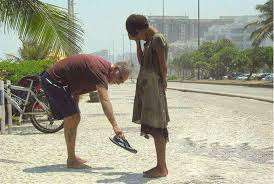

Sacrificial Giving
Dr. Chris Philip Mathew
The lives of Barnabas and Ananias teaches us about actions and repercussions within the Christian community. In Acts 4:32-5:14 we see a brand new kind of living – one where people sold their lands and houses to help poorer Christians. This was not a Government-mandated. It was the result of changed hearts leading to lifestyle changes.
Acts 4:32-34 reads "Now the multitude of those who believed were of one heart and one soul; neither did anyone say that any of the things he possessed were his own, but they had all things in common. And with great power the apostles gave witness to the resurrection of the Lord Jesus. And great grace was upon them all. Nor was there anyone among them who lacked; for all who were possessors of lands or houses sold them and brought the proceeds of the things that were sold, and laid them at the apostles’ feet, they distributed to each as any had need.''
Now remember that when the Bible uses the term all with regards to humans doing something, all doesn’t necessarily mean every single human being in the world, and even when reduced through specification to a single Christian community as we see in this passage, "all'' doesn’t necessarily mean every single human in that community. We see this repeatedly throughout Scripture. This is largely because humans are not robots and because humans are… very humanly inconsistent. We are not robots that make decisions based solely on facts, not merely because very often we do not have all the facts in front of us, but also because extraneous factors–the circumstances surrounding a particular event, the social or political blowback to our decisions, our own personal developmental goliaths, and many other factors affect our decision-making process. So even when the Bible refers to all humans being a certain way or all humans doing a certain thing, we have to recognize that this all is often a generalization used to describe the pervasiveness of a particular idea about humans. However, when God does something for all humans, we can very well believe that all means all simply because God is truthful, God is reliable, God is consistent. He has all the facts in front of Him, He is not be holden to anyone. He is above all circumstances. He is not trying to impress anyone. He is not making decisions in fear of anyone. He is God.
Coming back to our passage, we see that the multitude who believed were of one heart and one soul. Observe what they did. They lived like their possessions belonged to their Christian brothers and sisters. Who were the ones who could sell their lands and houses? Those who had more than one parcel of land or more than one house. If you’re wondering whether people lived on rent during Jesus’s time, then Yes, many people did live on rent. However, like today, the gold standard of wealth was to have your own house. The passage does not mean that people made themselves homeless and landless to give to their Christian brothers and sisters though I wouldn’t be surprised if any did do just that. It was completely voluntary and the first example we see of this is that of Barnabas who sold a parcel of land and placed the money at the apostles’ feet.
This action is actually the first time that an Old Testament promise is expounded as being put into practice in the Bible. In Dt 15:4-11, God promises that there will be no poor among the Israelites if they live like how God had instructed them to live. However, knowing that the Israelites would not consistently follow his laws, God says in verse 11 that the poor would always be in the land. In the New Testament even though there no longer was a 50-year Jubilee to cancel debts, by living out Proverbs 19:17, and with giving to the poor being equated with lending to the Lord, those who believed in Jesus Christ were living out the spirit of the Old Testament law without the shackles of it being a requirement. This is similar to companies in India helping communities in India before 2013. They had done it out of an intrinsic desire to help the local communities. However, from 2013, CSR (Corporate Social Responsibility) was enacted in India and whether or not companies wanted to, they were mandated to help local communities. Notice that when there is a transformation in the hearts of people, helping each other comes naturally. When people don’t help each other, this ‘help’ needs to be mandated.
What was the result of all this selfless sacrificial love and giving? Acts 4:33 - many came to know of the resurrection of the Lord Jesus Christ and the people who witnessed about Jesus were blessed with great favour from God. This then is the kernel of Christianity – to know that I am saved because Jesus loved me so selflessly and sacrificially that He died in my place for the forgiveness of my sins, that He physically rose again on the 3rd day, and is now my Advocate representing me in the court of God our Father. We become like the Person we worship. By trusting this selfless Jesus alone, can we however feebly even hope to exemplify His life of sacrificial giving and selflessness.
The problem arises when we think that we can fool God’s anointed leaders and the church. This is what a couple decide to do in Acts 5:1-11. Ananias and Sapphira sell a plot of land and colluding with each other, decide to keep back a portion of it, while acting like they gave everything to the church. I had often assumed that the apostles were at Ananias’s and Sapphira’s home when the events of their deaths happened because it seemed that Sapphira’s coming back in at Acts 5:7 suggested that she was coming back home. However, as I thought about it, I wondered why would the apostles be spending their time at the home of Ananias. Verse 12 informs us that the apostles were at Solomon’s portico which was built along the entrance to the Jerusalem temple just along the outer border of the Outer Court of the Temple. A portico is an unwalled, roofed walkway with pillars along the sides to hold up the roof. It was 606ft long x 23ft wide x 40ft high. This means that Solomon’s Portico alone would have occupied 32 cents of land. This is most likely where Barnabas and Ananias gave their proceeds to the apostles.
Now notice what Peter tells Ananias in Acts 5. Firstly, no one was obligated to sell their land, and secondly, even after the land was sold, no one was obligated to give the proceeds to the church. Besides this, lying to the church was equated with Ananias having lied to the Holy Spirit. Notice that the emphasis here is not on the money, but on lying to God by lying to the church. We see here a powerful example of Jesus in His role as judge. Since the church is the body of Christ on earth today, lying to the church is equated with lying to Jesus. This is the same as putting God to the test. Testing God’s patience, angering God is not something we as Christians should do. Some of us may think in our hearts – I can sin now and ask God for forgiveness later because God is a merciful God. This however, is what it means to put God to the test, to test God’s patience, to anger God. We should not assume to take God’s mercy for granted. Let us rather as children of God strive to utilise the grace of God, the strength of God in us, the help of the Holy Spirit to overcome sin. God has given us the Holy Spirit and as Christians we have the power to overcome sin. We must not succumb to sin, we must not justify it. Rather we must live lives of holiness giving honour and glory to God. We must not think that our God is a gracious God, so we can live unholy lives now and play with God’s mercy. Judgement awaits each of us – some of us will be judged faithful. My plea is that we all be able to live lives of selflessness and sacrificial love with Jesus Christ as our paragon.
